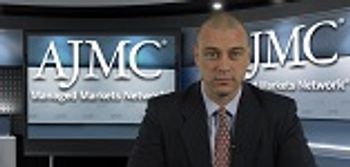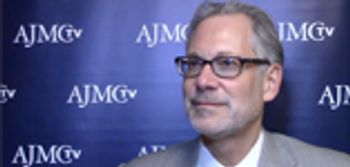
A. Mark Fendrick, MD, co-editor-in-chief of The American Journal of Managed Care and director of the University of Michigan Center for Value-Based Insurance Design, testified before a Michigan senate subcommittee on the benefit of clinical nuance.

A. Mark Fendrick, MD, co-editor-in-chief of The American Journal of Managed Care and director of the University of Michigan Center for Value-Based Insurance Design, testified before a Michigan senate subcommittee on the benefit of clinical nuance.

What we're reading, February 9, 2016: Novartis signs 2 performance-based deals for its new heart drug; 8 states significantly reduced uninsured rates; and the Obama administration will ask for $1.8 billion to prepare to fight the Zika virus.

Ensuring rapid, appropriate, and sustainable access to immuno-oncology therapies for patients in Europe: what role can policies play?

The latest Kaiser Family Foundation tracking survey of registered voters finds the ACA is only one of many issues considered in the choice of who they vote for.

Many key guidelines regarding Medicaid and CHIP eligibility, enrollment, renewal, and cost-sharing policies have changed and the 14th annual 50-state survey from the Kaiser Family Foundation identified all the major changes that occurred in 2015.

What we're reading, February 8, 2016: 12.7 million people signed up for Affordable Care Act coverage, but 30 million remain uninsured; HHS plans to continue to encourage Medicaid expansion; and report analyzes the effect of patient-centered medical homes on cost and quality.

To address the nationwide concern of costly immunotherapy agents, this article features health system inpatient and outpatient strategies that can help mitigate their costs.

For HIV-positive patients, cost considerations take on added importance because of the expensive antiretroviral prescription medications. As such, assessing premiums alone may not provide an accurate measure of plan affordability for HIV-positive patients.

The top stories in managed care this week included increased insurer concerns over the sustainability of the Affordable Care Act's insurance exchanges, healthy policy experts convened in DC, and 2 warnings for women to heed regarding pregnancy.

The healthcare industry is undergoing payment reform, which includes important initiatives like addressing social determinants of health, but may not be keeping the patient perspective central as these changes are made, Lewis Sandy, MD, senior vice president of Clinical Advancement at UnitedHealth Group, said at the AcademyHealth National Health Policy Conference.

Supporting, funding, and protecting the research and development of new medicines and new treatments is more critical, now than ever, to provide better treatments and better outcomes to all cancer patients.

What we're reading, February 4, 2016: President Obama is proposing changes to the widely disliked Cadillac tax; Florida declares a health emergency in 4 counties over Zika virus; and drug makers are pouring money into efforts to improve medication adherence.

On World Cancer Day, The American Journal of Managed Care would like to acknowledge the determination of cancer survivors and the support provided by various organizations to patients and their families.

The translation of immuno-oncology agents from the research to the practice arena may provide significant clinical benefit to patients with difficult-to-treat malignancies. The further development and marketing of these agents could escalate the discussion on care equity in a time of constrained resources.

Researchers from the Urban Institute find UnitedHealth's statements about leaving the exchanges at odds with recent actions.

Pediatric oncologists from across the country covened a task force to develop an ethical framework that guides decisions on allocation based on curability, prognosis, and the incremental importance of a drug to a patient’s outcome

What we're reading, February 2, 2016: Aetna joins other major insurers raising concerns over the Affordable Care Act's insurance exchanges; Sanofi announces plans to develop a Zika vaccine; and Martin Shkreli expected to testify despite dismissing the subpoena.

With increasing evidence of comparable efficacy and reduced toxicity of proton beam therapy, payers may have to reevaluate coverage policies.

An infographic that looks at what it means to be a physician leader, based on an interview with Anthony D. Slonim, MD, DrPH, president and chief executive officer for Renown Health.

Mortality in adolescent and young adult Hodgkin lymphoma patients is significantly affected by ethnic and socioeconomic factors, as well as insurance status, according to a new study published in Cancer Epidemiology, Biomarkers & Prevention.

At the annual meeting of the American Society of Hematology, physicians gathered to discuss the impact of alternate payment models on clinical practice.

What we're reading, January 29, 2016: newly approved hepatitis C cure will increase competition; California will vote on a proposition to control the cost of prescription drugs; and a special report details drug shortages and rationing decisions.

A new Blue Cross Blue Shield Association report provides the company’s snapshot of US health insurance trends.

The FDA has created the Drug Trial Snapshot, which provides details on the demographic profiles of participants in clinical trials of approved drugs.

What we're reading, January 28, 2016: Massachusetts' attorney general is threatening to sue Gilead Sciences over the high prices of its hepatitis C drugs; Anthem reports losses on Obamacare health plans; and consumers are satisfied with health coverage and limited networks.

259 Prospect Plains Rd, Bldg H
Cranbury, NJ 08512
© 2025 MJH Life Sciences®
All rights reserved.
